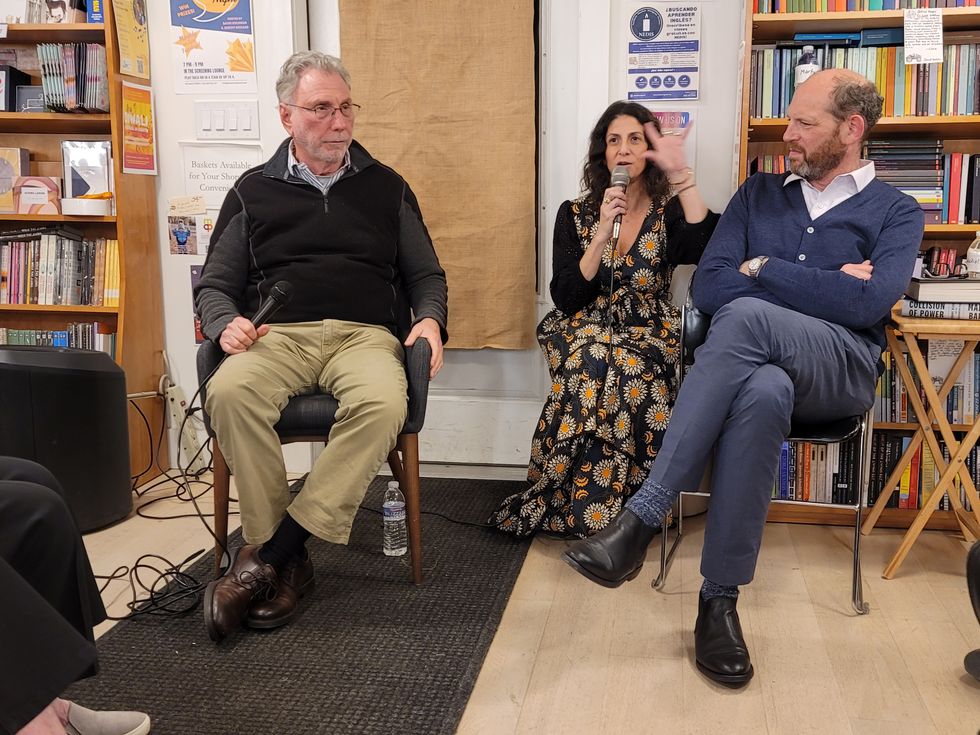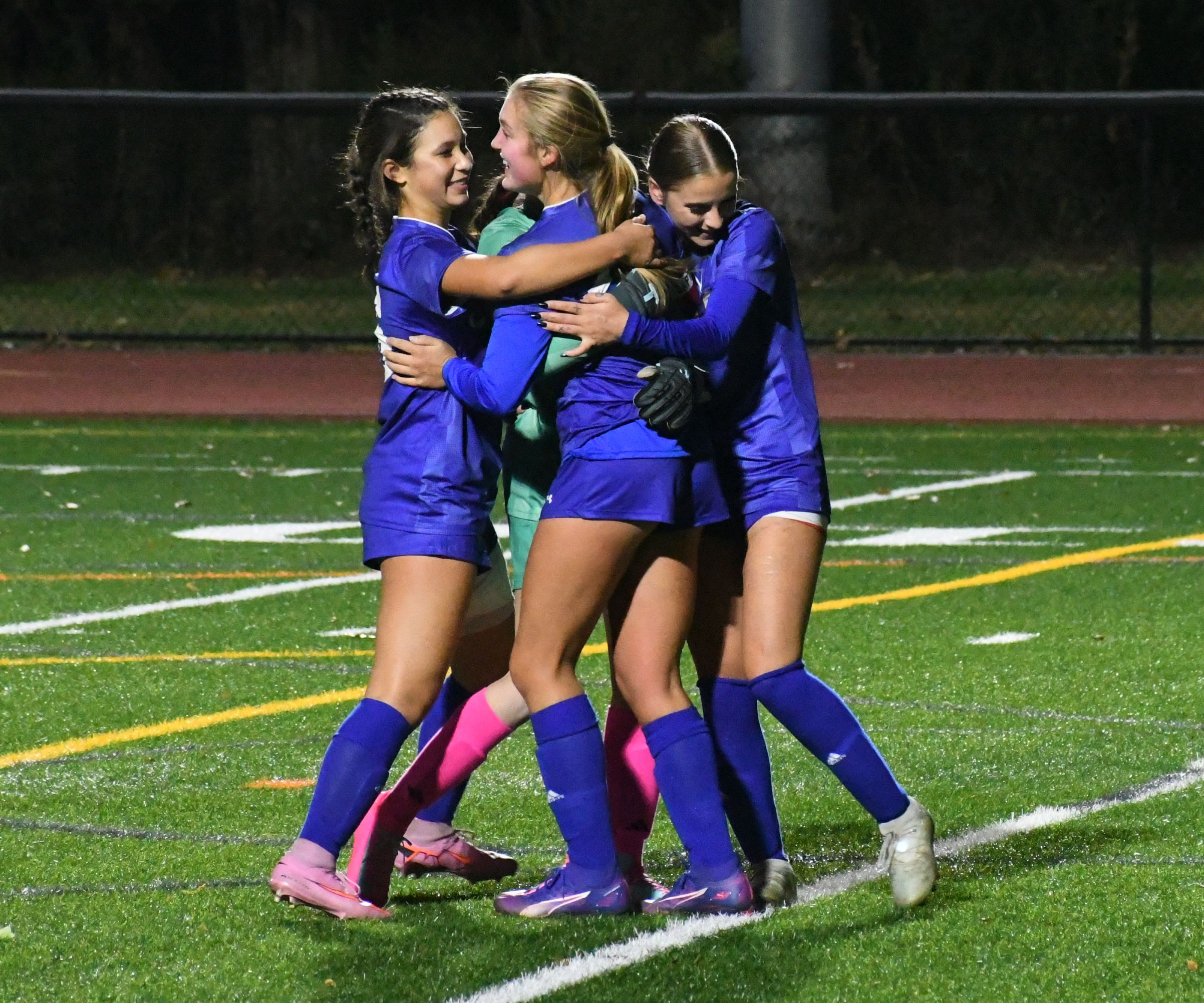Baron talks Trump, Bezos and The Washington Post

From left, author, journalist and editor Martin Baron with Merritt Bookstore owner of Kira Wizner and lawyer Nicholas Diamand. Photo by Judith O’Hara Balfe

It’s pretty certain that Jeff Bezos, Donald Trump and a host of other world-famous people remember Martin Baron as editor of, first, The Boston Globe, and then The Washington Post.
Some of the most important stories over the past 25 years crossed his desk. He made the decisions concerning what was printed and what wasn’t, always with integrity, fairness and the evidence to back it up.
Baron was at Merritt Bookstore in Millbrook on Wednesday, Nov. 15, for a talk and a book signing for his book “Collision of Power. Trump, Bezos, and The Washington Post.” He began his talk by introducing the fact that, after only seven months as editor at The Washington Post, it was bought by Jeff Bezos. He also described a dinner at the White House with newly elected president Donald Trump, relaying the fact that Trump would speak disparagingly of the paper and then jab Baron with his elbow.
In spite of the fact that there was a president in power who had campaigned against the media and who, all through his tenure, waged war against the press, The Washington Post wrote groundbreaking news, including covering stories about the NSA surveillance in the U.S., and the scandals that took place at the Secret Service.
The book is written in a straightforward, factual manner, with the journalist’s desire to answer all questions and the editor’s wisdom in knowing how to handle a barrage of information. The outcome leaves one satisfied, but not overwhelmed with unnecessary information.
Baron talks about people we have only heard about but wish we knew, and some others we know about and wish we didn’t. He gives us insight into how the media works, and what happens when it doesn’t work the right way. He even had tidbits about other newspapers and media that make it really interesting and gives one a feeling of knowing much more when we finish the book than when we started it. In some places its dark; in others, it’s fun.
One of the most interesting parts of the evening was during the questions asked by the audience and mediated by lawyer and Merritt friend Nicholas Diamand. When asked what Baron considers his “best” work, he answered that the assignment he handed over to a team of journalists in 2001 when he was at The Boston Globe will always be the most important. That was the expose that brought about the investigation into the abuse, by defrocked priest John Geoghan, of more than 80 young boys. This, in turn, brought about the unmasking of the extent of the abuse by many other priests in many other places, and investigations are still going on today. That story ended up being made into the award-winning movie “Spotlight.”
Questions were also asked about the future of print newspapers; Baron stated that, 20 years ago, he thought they had about 10 years left. He feels that they are existing now on borrowed time.
He does see a future for news and journalism in the digital age, as media becomes digitalized as the norm. Things are recorded as they happen, in real time, and can be seen immediately. More and more newspapers have begun to print less and less often, and most no longer deliver. Baron thinks that at some point, most newspapers will only print on Sundays, and the format will be more magazine than newspaper.
With that said, it’s a fascinating journey to read his book, to note the changes over the years that he wrote about, and a wonderful bonus is two sections of color photos in the book with people you will recognize. Also a bonus is Baron’s personal and up-close observations of people we all know and love or love to hate, and his insights as to why things may have happened as they did. It’s current, but it looks back just a bit while giving one a peek into the future.
WOODBURY — Nonnewaug High School claimed twin titles in the Berkshire League soccer tournament finals.
The school's girls and boys teams were named league champions after finishing the regular season with the best win/loss records. Winning the tournaments earned each team a plaque and added to the program's success in 2025.
Both of Nonnewaug's varsity teams faced off against their counterparts from Housatonic Valley Regional High School in the tournament finals in Woodbury Tuesday, Oct. 28.
The boys game was played first. Housatonic took a quick 2-0 lead with goals from Gustavo Portillo and Jackson McAvoy. Nonnewaug responded in the second half with three consecutive goals: first from Cash Medonis then two from Vincenzo Rose. The Nonnewaug boys won 3-2.

The girls game followed. Nonnewaug and Housatonic traded goals early on and the score was tied 2-2 at halftime. Nonnewaug scored twice more in the second half to win 4-2. Housatonic's goals were scored by Ava Segalla. Rosie Makarewicz scored twice for Nonnewaug and Hailey Goldman and Aubrey Doran scored once.
Connecticut Interscholastic Athletic Conference soccer tournaments begin Oct. 31. Both Housatonic teams qualified for the Class S tournament and both Nonnewaug teams qualified for the Class M tournament.
TORRINGTON — Joan Jardine, 90, of Mill Lane, passed away at home on Oct. 23, 2025. She was the loving wife of David Jardine.
Joan was born Aug. 9, 1935, in Throop, Pennsylvania, daughter of the late Joseph and Vera (Ezepchick) Zigmont.
Joan graduated from Harding High School.
She was a working artist for much of her adult life, starting her career studying plein air impressionist oil painting at the Cape Cod School of Art. Her work evolved to include a more representational style, and eventually a large body of abstract pieces. Her award-winning work has been shown in galleries and juried art shows throughout southern New England.
She is survived by her daughter Leslie and her husband George, brothers Joseph, Victor, and their families, nephews Gregory, Christopher, and their families, daughter-in- law Huong, and the extended Jardine family. She was predeceased by her son Douglas, and brother Michael.
A memorial service will be held at All Saints of America Orthodox Church, 313 Twin Lakes Road, Salisbury, Connecticut on Thursday, Oct. 30, at 10 a.m. Memorial contributions may be made to the All Saints of America Orthodox Church, PO Box 45, Salisbury, CT 06068.
The Kenny Funeral Home has care of arrangements.
The ofrenda at Race Brook Lodge.
On Saturday, Nov. 1, the Race Brook Lodge in Sheffield will celebrate the Mexican Day of the Dead: El Día de los Muertos.
Mexican Day of the Dead takes place the first weekend of November and honors los difuntos (the deceased) with ofrendas (offerings) on an altar featuring photos of loved ones who have passed on. Elements of earth, wind, fire and water are represented with food, papel picada (colorful decorative paper), candles and tequila left for the beloved deceased. The departed are believed to travel from the spirit world and briefly join the living for a night of remembrance and revelry.
Music and events programmer Alex Harvey has been producing Día de los Muertos at Race Brook for the past three years, and with the closing of the venue looming, the festival takes on a deep and personal meaning.
“The anchoring gesture of Race Brook, long before I arrived on the scene, has always been to cultivate a space that thins the veil between the worlds. Something otherworldly is hiding in the mountain’s towering shadow: the whispering spring-fed stream, the dense lineage that founder Dave Rothstein brings, the woodsmoke that rises every night of the year from the firepits. This space communes with the spirits,” said Harvey.
“And so we cradle a special ache in our hearts as the leaves turn and the beautiful dance of Race Brook’s project of cultural pollination draws to a close. Fitting, then, to return for one last activation — Día de Los Muertos — a celebration of the end of things. A remembrance of those who’ve made the transition we are all destined for, but also a time when we honor many types of loss. And while we will all mourn those who aren’t there in the flesh, we will also, with humility, come as mourners for the space itself,” Harvey continued.
The event will be a night to remember, to celebrate and to release with ritual, music, and communal remembrance. Participants are invited to bring photos, talismans and offerings for the ofrenda (offering), as well as songs, poems or toasts to share in tribute to loved ones who have passed.
Mexican American musicians Maria Puente Flores, Mateo Cano, Víctor Lizabeth, Oviedo Horta Jr. and Andrea from Pulso de Barro, an ensemble rooted in the Veracruz tradition of son jarocho, will be performing.
Translating to “Pulse of the Clay,” their name reflects a deep connection to the earth and to the living heartbeat of culture itself. Through a synthesis of Mexican, Cuban, Venezuelan and Puerto Rican traditions, Pulso de Barro merges poetry, rhythm and communal song as pathways to coexistence with nature. Their performances feature the jarana and leona (stringed instruments), quijada, cajón, maracas, and marimba (percussion), the tarima (percussive dance platform) and a call-and-response of folk and original versadas.
The evening begins at 6 p.m. in the Barn Space with a Fandango de los Muertos featuring Pulso de Barro, a Race Brook favorite. At 8 p.m., the Open Mic for the Dead invites guests to speak directly into the spirit world — through word, music or memory. The night culminates at 10:30 p.m. with a Fandango for the Dead, a participatory music and dance celebration. Bring your instruments, your voices and your dancing shoes.
Race Brook Lodge is a unique rustic getaway destination for relaxation, hiking, live music, workshops, weddings and more. Sadly, it will be closing for good later in 2026, ending a storied chapter of Berkshire music, art, culture and well-being.
Come experience an evening that honors lost loved ones and the end of a Berkshire institution. The cycle of life endures. Surely, resurrection is in the cards for Race Brook Lodge.
For Tickets and info, visit: rblodge.com